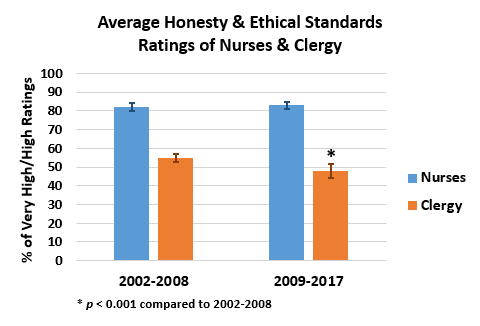In a couple of recent posts (here and here), I began to think about last year’s results of the Gallup poll of U.S. public opinion of the honesty and ethical standards of various occupations. I’m still thinking about it, despite my break from discussing the topic in recent weeks. At the moment, I’m looking again at the trend data going back to 2002. Combined in part with some recent thoughts on men and nursing (here and here), I’m engaged in the development of my personal philosophy and theology of nursing. I’d be delighted to discuss these topics as I travel this road.
The trend data readily available involve the combined Very High and High ratings of the overall honesty and ethical standards of various occupations. For 2018, approximately 84% of respondents rated nurses at these levels, whereas only 37% rated clergy at these levels. For the period 2002-2017, nurses were rated Very High or High an average of 82.5% ± 1.9% each year. For the same period, clergy were rated at these levels an average of 51.0% ± 4.8% each year. In fact, the Very High/High rating for clergy has experienced a downward trend since about 2010.
This downward trend is interesting to me, and there are probably multiple explanations for it. Perhaps highly publicized moral scandals within prominent religious organizations are partly to blame. Perhaps our nation’s changing political climate has something to do with it. In any case, the statistical trend is profound. Considering 2002-2008, nurses were rated Very High/High in honesty by an average of 82.0% ± 2.2% of respondents. From 2009-2017, they were rated similarly (82.9% ± 1.8%, t-test p = 0.38). On the other hand, clergy were rated significantly lower from 2009-2017 (47.9% ± vs. 4.0%) than they were from 2002-2008 (55% ± 2.1%, t-test p < 0.001). This comparison would be even more significant if we were to include data from 2018.

As a second-career nurse who has also previously considered Christian ministry as a second career, I have often found similarities between the reasons I entered nursing school and the reasons I’ve wanted to enter seminary. It would take me too far afield to discuss those reasons in detail here, but I’m confident I’ll discuss them here eventually. In the meantime, let me begin with the thought that it may not be necessary to assume that men serving in roles previously thought of as nursing are serving precisely as nurses. By contrast, there is ample precedent for the notion that women serving in clerical roles in some religious groups may be thought of as something other than clergy.
It’s intriguing to me to consider the gender and sexuality aspect of public opinion concerning nurses and clergy. Specifically, I’d be interested to know whether the American public considers males or females more honest and to have higher ethical standards than the other. It seems to me I’ve come across a study along these lines at some point. In addition, I’d like to know whether or not these opinions vary with the occupation considered. One could imagine the importance of traditional associations between gender and certain occupations. For example, men have traditionally been accepted in the role of clergy, whereas nursing has come to be dominated by women. The same may be true of various other occupations, but I’m particularly concerned with nursing and clergy. Given these traditional associations, what is the real effect on U.S. public opinion of the honesty and ethical standards of men when they engage in the traditionally female field of nursing? Of women when they engage in the traditionally male field of clergy?
What would you predict?
One thought on “Honesty and Ethical Standards Among Nurses, Part 3: Nursing vs. Clergy”
Comments are closed.